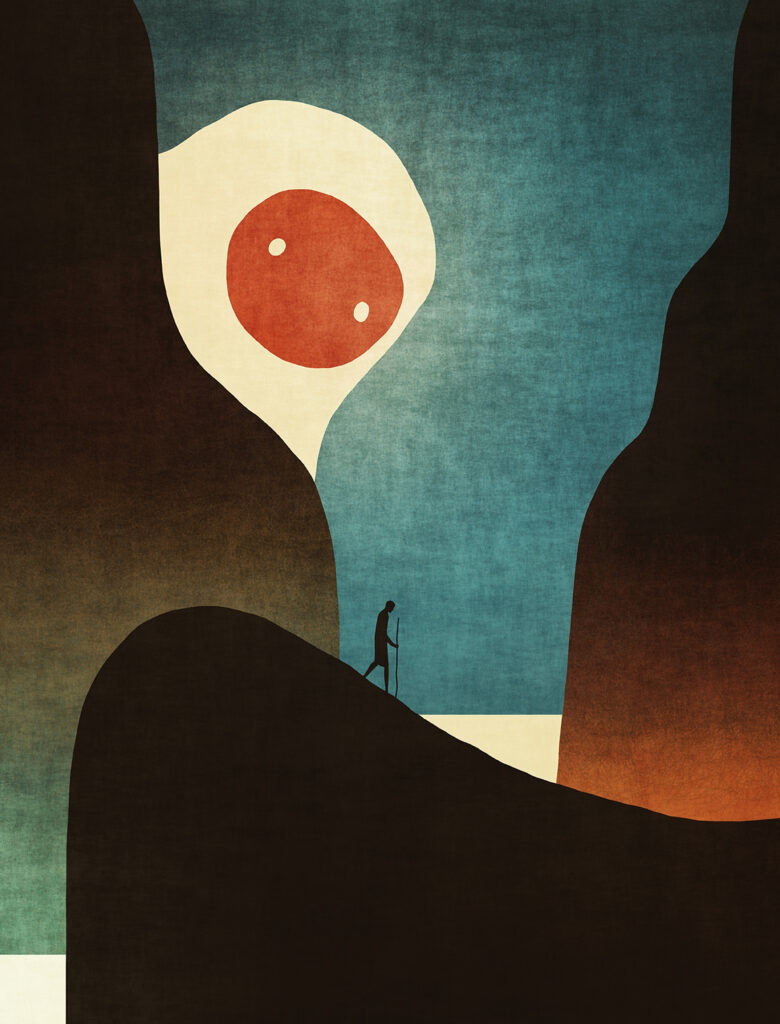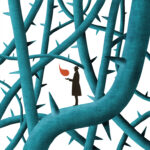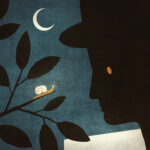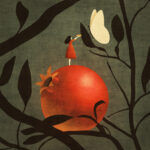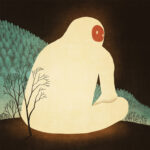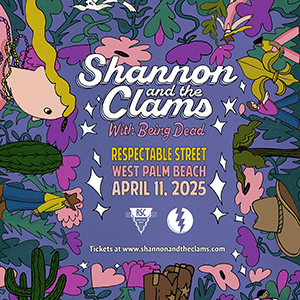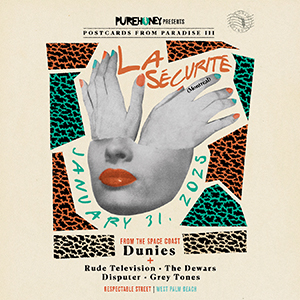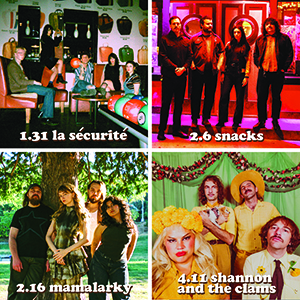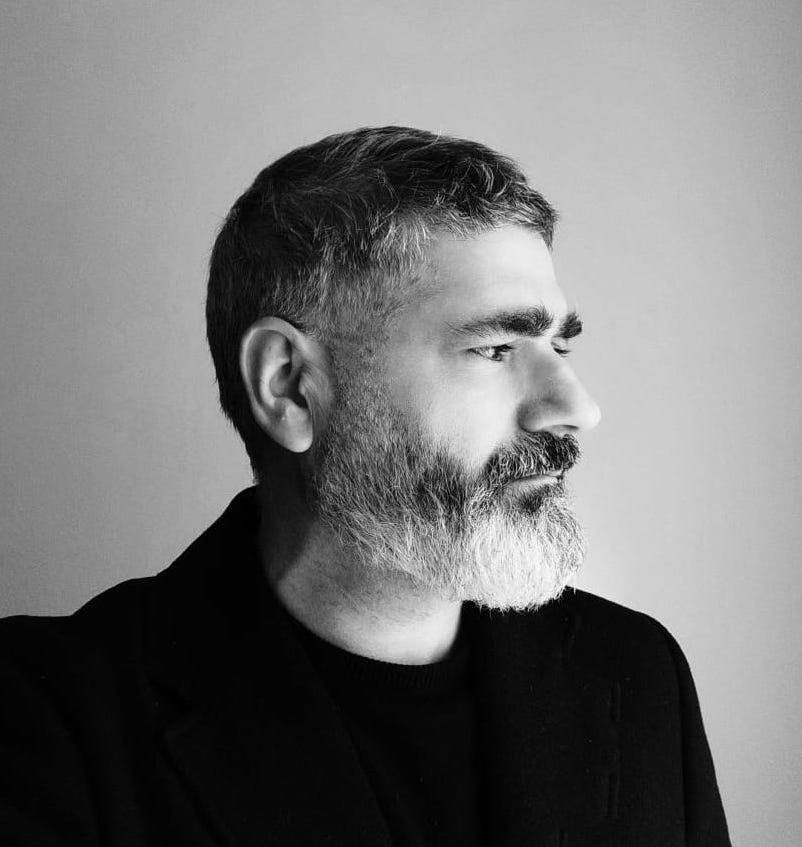 Island dweller Toni Demuro brings his whimsical visual world to the pages of PureHoney this month, and with him comes a long list of distinguished credits. Sardinia, Italy-based Demuro has provided illustrations for The New York Times, National Geographic and, of particular interest, Penguin Random House publishing.
Island dweller Toni Demuro brings his whimsical visual world to the pages of PureHoney this month, and with him comes a long list of distinguished credits. Sardinia, Italy-based Demuro has provided illustrations for The New York Times, National Geographic and, of particular interest, Penguin Random House publishing.
Among the dozens of book covers he’s designed, many feature solitary figures in strikingly small scale against a vast landscape. Paired with a twilight palette — black, slate blue, burnt umber — the final product evokes magic, melancholy and nostalgia. Imagine the thoughts of a solo traveler who has spent a long night out in a foreign land and is witnessing the break of a new day.
“My images tell a lot about me and the people I love,” Demuro says in an interview. “They arise from a conversation, from a story, from a feeling. Each image has a specific reference to what I experience emotionally on a given day; it’s like a diary in images. Sardinia is my land; time and space here have a profound and ancestral meaning, influencing my existence and, therefore, my work.”
The terms used to describe Demuro’s work — poetic, strange, emotive — have also been applied to an author whose book covers Demuro is frequently chosen to design: Haruki Murakami, the Japanese worldwide best-seller for titles such as Norwegian Wood and The Wind-Up Bird Chronicle.
Demuro muses that the affinity between them is “perhaps because my illustrations are evocative of an inner world, between reality and dream. As Murakami does, I like to arouse curiosity and oscillate between balance and precariousness.”
The literary characters in Demuro’s portfolio and the figures he creates for himself aren’t dissimilar: Business-suited men with retro radios for heads, silhouetted tree people, and figures removing masks to reveal a drastically different face beneath populate both realms.
While each viewer will have their own interpretations, Demuro has offered clues to his symbolic imagery. Some characters, which he calls bird-men, are styled to look like birds but cannot fly: Like Icarus, they strive to achieve more than what nature has equipped them for. A desert landscape suggests introspection because of its unending nature — a reminder that no matter how far we walk, we cannot escape ourselves.
“Some of my characters seem to be wearing a mask, but in reality, that is their face,” Demuro says. “The main intent is to make the character mysterious and aesthetically pleasing. I find that we all wear masks, there is nothing unnatural about it, it doesn’t mean pretending or hiding our true nature, it means playing roles, it means wearing the various aspects of our personality.”
As for the surroundings these figures inhabit, Demuro’s landscapes are informed by his environment. Sardinia is both coastal and mountainous, with desert-like beach dunes, limestone hills, rocky plains, and old-world cities and villages in between. But local features take on a surrealistic air — familiar geography bent and stretched like a Salvador Dali object until it becomes something uncanny.
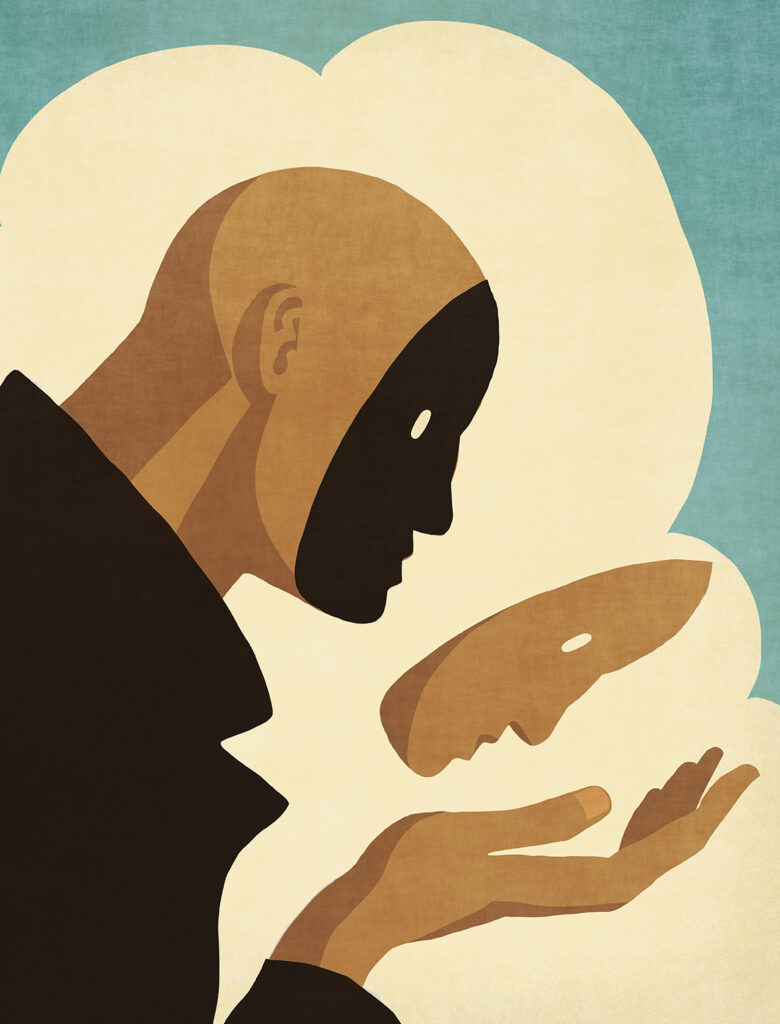 Demuro drew early inspiration from one of the original surrealists, Giorgio de Chirico. “As a boy, I was greatly inspired by De Chirico. I was fascinated by his Italian squares, the colors, the symbols, and the suspended atmospheres,” he says. “Today, however, I draw inspiration from my inner world. It is as if everything I have studied and loved in my past and the emotions I experience today were transformed by my unconscious.”
Demuro drew early inspiration from one of the original surrealists, Giorgio de Chirico. “As a boy, I was greatly inspired by De Chirico. I was fascinated by his Italian squares, the colors, the symbols, and the suspended atmospheres,” he says. “Today, however, I draw inspiration from my inner world. It is as if everything I have studied and loved in my past and the emotions I experience today were transformed by my unconscious.”
Demuro finds music to be a crucial supplement to the unconscious and metaphysical aspects of his practice. “I listen to various genres ranging from indie-rock to country, from blues to jazz,” He says. “It depends on the mood of the moment and what I want to convey about my interiority. I can’t say that it directly influences my art, but it certainly helps me evoke the images I have inside.”
For all its strangeness, Demuro’s work aims to create feelings of peace, harmony and beauty. “I try to focus on the magnificence and majesty of nature toward humans, who are only temporary guests on this planet,” he says, adding, “We’re doing more harm to ourselves than to nature.”
Find Toni Demuro at tonidemuro.com and at instagram.com/tonidemuro ~ Kelli Bodle

